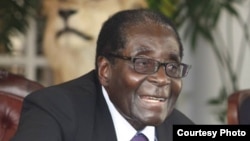President Robert Mugabe is next week expected to hand over the chairmanship of the Southern African Development Community (SADC) to Botswana’s Seretse Khama Ian Khama at a regional summit in Gaborone.
But many Zimbabweans have mixed feelings about his legacy and achievements at the helm of the regional bloc.
Some say he did not achieve much while others says Mr. Mugabe used the opportunity to clean-up the country’s battered image abroad and in the process reclaiming his status as a true African statesman.
Leader of the country’s main opposition Movement for Democratic Change party and former Prime Minister, Morgan Tsvangirai does not think Mr. Mugabe achieved anything during his term as SADC chair.
“President Mugabe’s legacy as chairman of AU and chairman of SADC has not achieved anything significant because of the crisis in Zimbabwe,” said Tsvangirai.
“The crisis of Zimbabwe is a crisis of legitimacy and a crisis of governance. You can’t be a leader of these organizations when the first accusation is that you have to put your house in order first.”
Tsvangirai, Mugabe’s bitter rival since 1999, says the 91 year old President is clueless as to how he can take the country out of the economic mess it finds itself in today, adding leading the two continental bodies had not helped at all.
The former Prime Minister says Zimbabwe will be back on the regional bloc’s agenda once Mr. Mugabe relinquishes the chairmanship next week.
“What it means is that SADC must be able to say we have a situation in Zimbabwe in which the regime is not stable – it’s imploding,” said Tsvangirai.
“We have a situation where the potential of Zimbabwe is being wasted because it’s isolated internationally. So it’s unavoidable to bring back Zimbabwe on the SADC agenda.”
Terence Chimhavi, director at the Organization for Zimbabwe Trust, told VOA Studio 7 Mr. Mugabe’s chairmanship of SADC and the African Union had been blighted by Zimbabwe’s own economic and social problems.
This, he said, led to Mr. Mugabe’s failure to deal with regional and continental problems.
“We really didn’t see SADC doing much,” said Chimhavi. “Maybe they did behind closed doors. Look at the terrorism that we have seen in other African countries but we have not seen the AU doing much to deal with this issue.”
The chairmanship of both the SADC and AU are largely ceremonial posts hence not much is expected from any leader chairing the blocs.
But Harare hyped Mr. Mugabe’s chairmanship of the AU and SADC raising expectations on what he could possible do during his tenure.
Political commentator, Takura Zhangazha, says even Botswana President Ian Khama, who is taking over from Mr. Mugabe, is likely not to have any impact regionally.
Zhangazha, however, to some extent disagrees with Tsvangirai and Chimhavi saying Mr. Mugabe’s chairing of SADC had somehow “normalized” Zimbabwe as a country after years of crises.
“The main benefit is that we became a normal country. And therefore in the regional we came to be somewhat respected as a normal country with a normal leadership, that’s the only benefit, but materially there is no other benefit which we get from chairing SADC, which is actually a routine post and ceremonial. You don’t do anything spectacular as SADC chairman because SADC is run by consensus,” said Zhangazha.
He said Zimbabwe, through Mr. Mugabe’s chairmanship of the bloc did not achieve anything different from past SADC chairmen since the post is not an executive one.
Mr. Mugabe, he said, was unable to play an effective role in the Lesotho and Madagascar crises also because Harare had its own crisis at home that needed attention.
University of Zimbabwe lecturer, Professor Charity Manyeruke believes President Robert Mugabe played a crucial role resolving both crises and cooling down temperatures during the xenophobic attacks on foreigner in South Africa.
“President Mugabe helped calm down tempers during the xenophobic attacks in South Africa because many nations were affected and angry,” she said, adding she expects the SADC leaders at their meeting next week to remove trade and economic barriers hindering regional growth as well to open-up borders so people can move freely between the countries in the region.
Zhangazha says it’s unlikely the barriers will removed saying some countries in the region like Zimbabwe are pursuing policies that are not in line with regional best practices.





